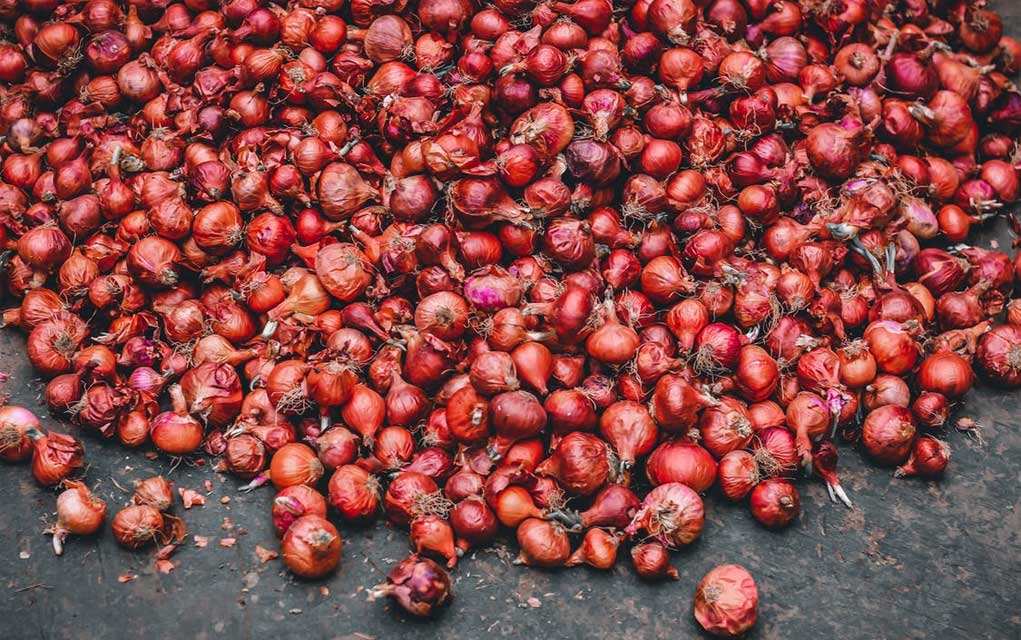Type 2 diabetes can lead to serious health complications and it is essential to look out for symptoms and take preventative measures. Eating this vegetable could reduce your risk of developing the condition.
Type 2 diabetes can develop without any major warning signs. It’s estimated that around a third of people who have type 2 diabetes don’t know they have it. Type 2 diabetes is a common condition that causes a person’s blood sugar levels to become too high. For a person who suffers from diabetes, their pancreas doesn’t produce enough insulin and insulin controls the amount of glucose in the blood. Eating a healthy diet and exercise can help keep the risk of developing diabetes at bay, however, certain food can also help.
Onions have been used for medicinal purposes since the ancient times and were used to treat conditions such as headaches, heart disease, and mouth sores.
Onions are members of the Allium genus of flowering plants that also includes garlic, shallots, leeks, and chives. Onions contain various vitamins, minerals, and potent plant compounds that have been shown to promote health in many ways.
Eating onions help control blood sugar, which is especially significant for people with type 2 diabetes. Specific compounds found in onions possess anti-diabetic effects.
Other benefits of onions:
- Loaded with nutrients
- Helps with heart health
- Loaded with antioxidants
- Helps fight against cancers
- Boosts bone density
- Aids with digestive health
A study presented at the Endocrine Society’s 97th annual meeting conducted on diabetic rats showed that when rats were given Allium cep – or onion bulb extract, their blood glucose, and cholesterol levels were significantly reduced.
The rats given the larger doses of onion extract reduced their blood glucose and cholesterol levels. Antony Ojieh, lead investigator of the study said: “Onion is cheap and available and has been used as a nutritional supplement.
“It has the potential of ruse in treating patients with diabetes.”
Tips for incorporating onions into your diet:
- Add caramelized onions to savoury baked goods
- Add thinly sliced onions to your salads
- Use onions for stocks and soups
- Make onion soup
- Blend raw onions with fresh herbs, vinegar, and olive oil for homemade salad dressings
Defeat Diabetes Foundation said: “Onions have been consistently linked to cardiovascular health, for example, and the low glycemic index of onions suggests an ability to help control blood sugar levels.
Research has also shown that ripe onion juice has anti-diabetic properties, and specifically that its consumption can help prevent hyperglycemia in diabetics.”
Important Notice: This article was originally published at www.express.co.uk by Jessica Knibbswhere all credits are due.
Disclaimer
The watching, interacting, and participation of any kind with anything on this page does not constitute or initiate a doctor-patient relationship with Dr. Farrah®. None of the statements here have been evaluated by the Food and Drug Administration (FDA). The products of Dr. Farrah® are not intended to diagnose, treat, cure, or prevent any disease. The information being provided should only be considered for education and entertainment purposes only. If you feel that anything you see or hear may be of value to you on this page or on any other medium of any kind associated with, showing, or quoting anything relating to Dr. Farrah® in any way at any time, you are encouraged to and agree to consult with a licensed healthcare professional in your area to discuss it. If you feel that you’re having a healthcare emergency, seek medical attention immediately. The views expressed here are simply either the views and opinions of Dr. Farrah® or others appearing and are protected under the first amendment.
Dr. Farrah® is a highly experienced Licensed Medical Doctor certified in evidence-based clinical nutrition, not some enthusiast, formulator, or medium promoting the wild and unrestrained use of nutrition products for health issues without clinical experience and scientific evidence of therapeutic benefit. Dr. Farrah® has personally and keenly studied everything she recommends, and more importantly, she’s closely observed the reactions and results in a clinical setting countless times over the course of her career involving the treatment of over 150,000 patients.
Dr. Farrah® promotes evidence-based natural approaches to health, which means integrating her individual scientific and clinical expertise with the best available external clinical evidence from systematic research. By individual clinical expertise, I refer to the proficiency and judgment that individual clinicians acquire through clinical experience and clinical practice.
Dr. Farrah® does not make any representation or warranties with respect to the accuracy, applicability, fitness, or completeness of any multimedia content provided. Dr. Farrah® does not warrant the performance, effectiveness, or applicability of any sites listed, linked, or referenced to, in, or by any multimedia content.
To be clear, the multimedia content is not intended to be a substitute for professional medical advice, diagnosis, or treatment. Always seek the advice of your physician or other qualified health providers with any questions you may have regarding a medical condition. Never disregard professional medical advice or delay in seeking it because of something you have read or seen in any website, video, image, or media of any kind. Dr. Farrah® hereby disclaims any and all liability to any party for any direct, indirect, implied, punitive, special, incidental, or other consequential damages arising directly or indirectly from any use of the content, which is provided as is, and without warranties.









